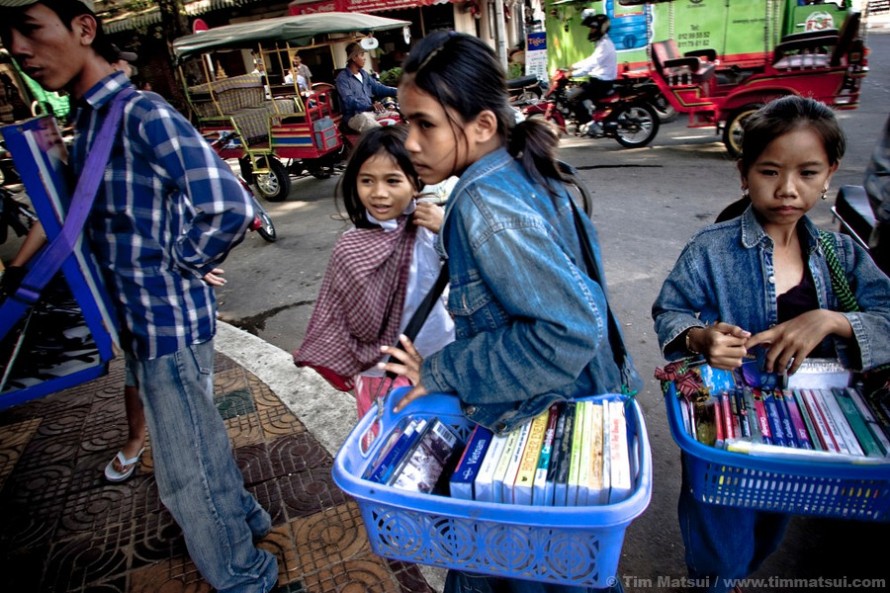Why You Should Buy Stuff From Kids
Why do you vote, if you vote at all? Most people vote for the symbolism. Few people vote for the effects.
According to political analyst Kenneth Shepsle (shout-out to Professor Jasper LiCalzi at The College of Idaho, who forced me to read Shepsle’s works), the best motivating factor to get people to vote is to make the act personally, symbolically meaningful. A rational person knows that their single vote won’t change the election, even in a more democratic country. Instead, people want to vote for the symbolism.
I always immediately want to refute Shepsle’s point by saying, “But if everyone thought that their vote didn’t matter, then no one would vote at all!” That’s probably part of the reason why only about60% of Americans voted in the last presidential election though. In Cambodia, many people do not vote because they know that the outcome will be the same no matter what. They are focused on the effects of the act of voting, not the symbolism. Maybe if the symbol was more important, more people would vote.
I keep comparing this idea with the issue of buying things from kids in Cambodia. Most foreigners I know refuse to buy things from children for the mere symbolism of supporting child labor.
For those of you that already live in Cambodia, I’m sure you have already encountered too many kids in tattered clothes, walking the streets at night, carrying knick-knacks in overloaded baskets. For those of you that don’t live here, there is a lot of in-your-face child labor in this country. A walk down the riverside in Phnom Penh leads to encounters with eight-year-olds selling books, bracelets, or flowers. Lounging on the beach in Sihanoukville is inevitably mixed with kids trying to paint your nails, thread your hair, sell you fruit, etc. Even the simple act of stopping at a stoplight cannot be enjoyed without children peddling decorative, fragrant jasmine flowers for 13 cents each. I’ve seen a seven-year-old girl beaten up by a 17-year-old boy for trying to sell books inside his restaurant (don’t worry, I yelled at him). A five-year-old jasmine flower seller stole 500 riel (13 cents) right out of my pocket while I was sitting on my moto at a stoplight. I’ve had long conversations with 12-year-old girls in Sihanoukville with no parents as they braided my hair and tried to convince me to pay them. A young boy in Siem Riep asked me to give him eight bucks for a bottle of water so he could pay for a month’s worth of schooling. Kids are everywhere in this country, and they are selling stuff.
The first time I came to Cambodia, I read some books beforehand (e.g.) that talked about horrible things, like adults taking in orphans and employing them as slave-peddlers, taking all of the money for themselves, or wealthy or middle class parents who refuse to send their children to school and employ them instead. Similar stuff to what you may have seen in the famous movie Slumdog Millionaire. After reading about all of the problems associated with child labor, I stopped buying things from kids for the symbolism, refusing to support these horrible adults’ acts, i.e. Sheple’s idea.
But then I started thinking about the effects of my imposing morality. Even if I don’t buy and continue to theoretically oppose child labor, it all continues, and the kid remains sad and hungry. If I buy, maybe they’ll have some food to eat, maybe to go to school. Then again, maybe it will go to their alcoholic father.
With voting, the symbolic act really only effects the citizen and their romantic, patriotic feelings about participating in democracy. One unused ballot doesn’t determine whether or not the candidate of choice gets elected. But children peddlers are real and raw. Their face is in your face, their bony, dirty hands clutching huge baskets that are far too heavy for them to carry.
So now, sometimes, I buy stuff from kids. Maybe by the end of this year I’ll have two wrists full of bracelets, and I can think about each bracelet, each child, and hope that I lightened the load of their burdensome baskets.
To conclude, here are some pros and cons of buying stuff from kids for you to mull over:
To buy:
Pro: The kid smiles and probably even gets excited.
Con: The happiness, though perhaps genuine, is fleeting.
Pro: The kid has some money, maybe to go to school, maybe to eat. Education and food are good things.
Con: Maybe not. You’ll never know where the money goes.
Pro: It creates a positive interaction between you and another person which would not have happened otherwise.
Con: You still don’t know where the money is going, a factor which may be dependent on whether or not the interaction can count as positive.
…or not to buy:
Pro: You’re symbolically telling the kid that you do not promote his work activities.
Con: The kid keeps working anyway, and so do all of the other kids. Your high-falutin message goes unheeded.
Pro: You save money. You can’t rescue all of the street kids by buying all of the bracelets in Cambodia.
Con: But maybe you can feed one? Also, you miss out on buying some nice-smelling flowers or pretty bracelets, which you may have wanted anyway.
Pro: It’s easier to forget about the kid if you avoid eye contact.
Con: You have a negative interaction with the child, or pass up on having any interaction at all.
